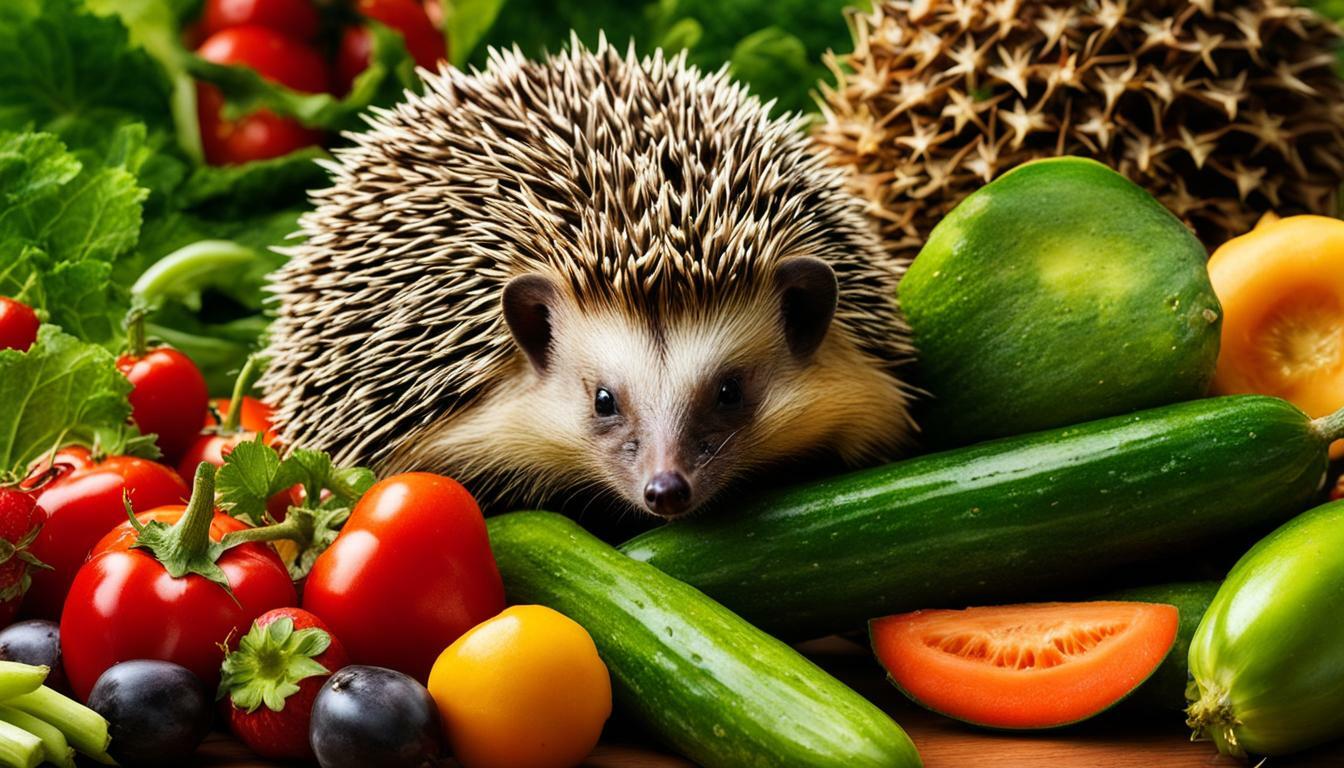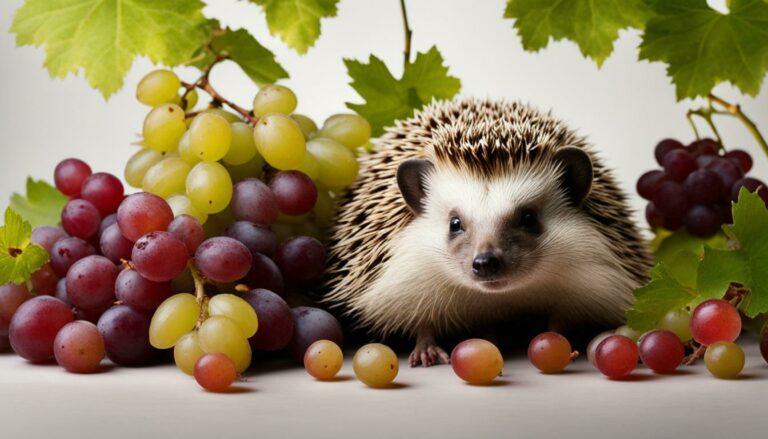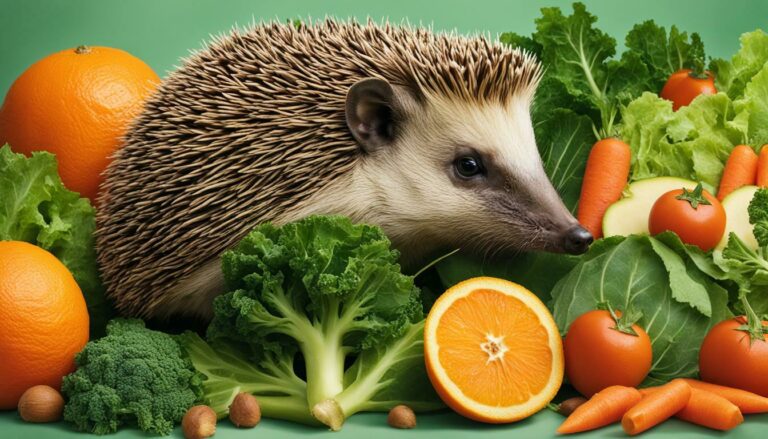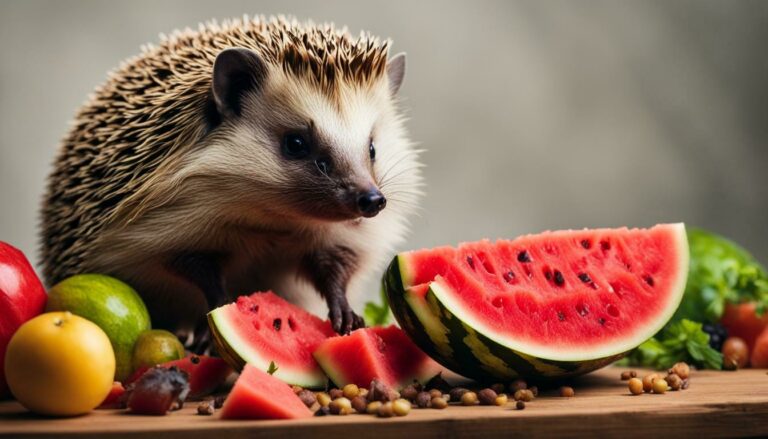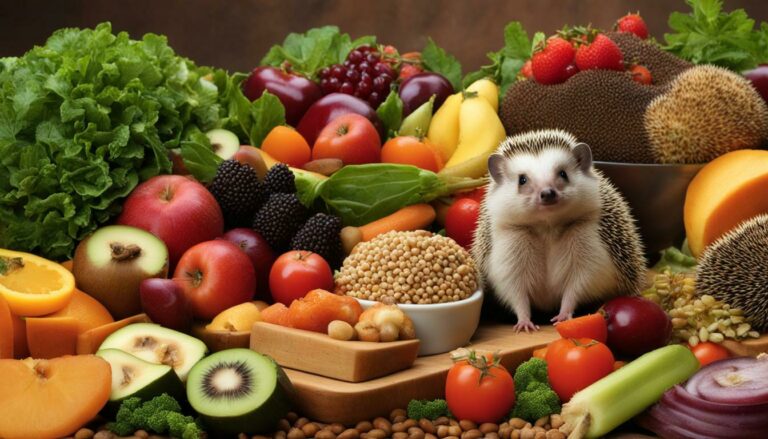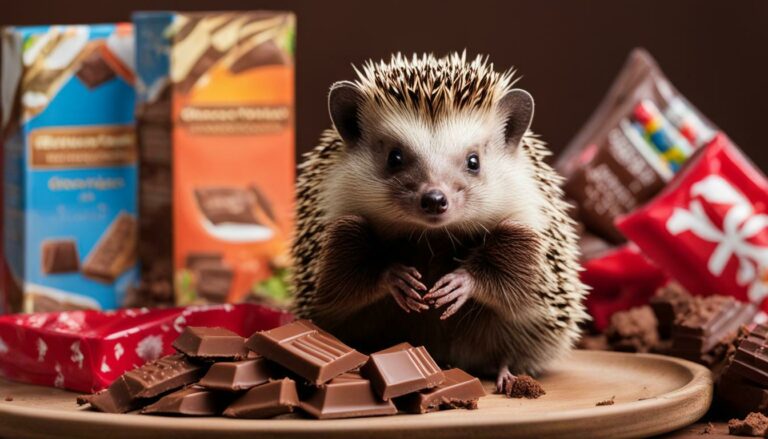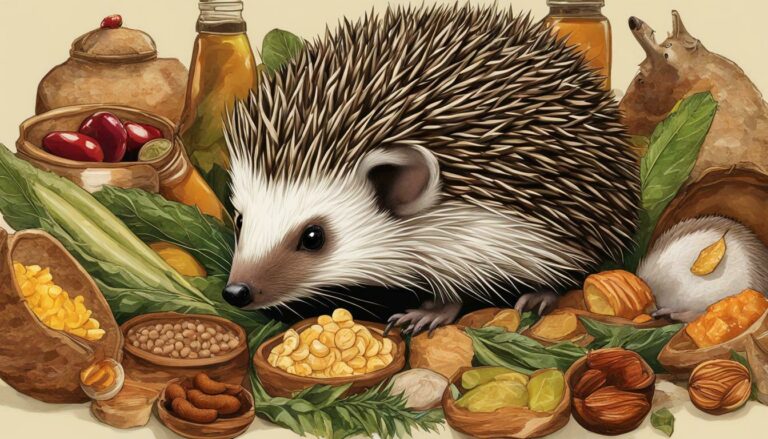Can Hedgehogs Eat Cucumber? Nutrition Guide for Pet Owners
Are you curious about whether hedgehogs can eat cucumber? In this comprehensive nutrition guide for pet owners, we will explore the topic and provide valuable insights into the benefits and precautions of feeding cucumbers to hedgehogs.
Key Takeaways:
- Hedgehogs can safely eat cucumbers as they are packed with essential nutrients and high water content, making them a refreshing summer snack.
- Cucumbers should be served in moderation as they do not fulfill all the nutritional requirements of hedgehogs. It is important to incorporate other foods, such as kibble and insects, into their diet for a balanced nutrition.
- Cucumbers offer various benefits for hedgehogs, including hydration, immune system support, healthy bone development, prevention of diseases, and weight management.
- Precautions should be taken when feeding cucumbers to hedgehogs, such as serving them in small portions, removing any seeds, avoiding wax-coated cucumbers, and being mindful of potential digestive issues.
- Proper preparation of cucumbers, including washing, peeling, and steaming, ensures the safety and ease of consumption for hedgehogs.
Now that we have covered the key takeaways, let’s dive into the details of feeding cucumbers to hedgehogs and explore the nutritional value of this popular vegetable.
The Benefits of Cucumbers for Hedgehogs
Cucumbers offer several benefits for hedgehogs, making them a healthy addition to their diet. Let’s explore the nutritional advantages of feeding cucumbers to these adorable pets.
Firstly, cucumbers are packed with water, which helps hedgehogs stay hydrated, especially during the hot summer months. With over 95% water content, cucumbers ensure that hedgehogs never get dehydrated, promoting a healthy digestive system and preventing issues like constipation and kidney stones.
Cucumbers are also rich in essential vitamins such as Vitamin C, Vitamin K, and Vitamin A. These vitamins contribute to a stronger immune system, helping hedgehogs ward off diseases and stay healthy. Additionally, the presence of calcium and phosphorus in cucumbers supports the healthy growth of young and pregnant hedgehogs, ensuring their bones develop properly.
| Nutrients | Amount |
|---|---|
| Vitamin C | 2.8 mg |
| Vitamin A | 1% |
| Vitamin K | 16.4 mcg |
| Calcium | 16 mg |
| Phosphorus | 24 mg |
In addition to vitamins, cucumbers contain antioxidants that help prevent various heart and lung diseases in hedgehogs. These antioxidants also contribute to overall health and well-being.
While cucumbers offer numerous benefits, it is important to feed them in moderation. Overfeeding cucumbers can lead to problems such as the formation of kidney stones and digestive issues. The presence of cucurbitacins, which give cucumbers their bitter taste, can be harmful if consumed in excess and may cause digestive problems or diarrhea in hedgehogs.
To ensure safe consumption, it is recommended to serve cucumber slices in small quantities, not exceeding one or two slices once a week. This prevents the risk of overfeeding and allows hedgehogs to enjoy the benefits without any adverse effects. Additionally, it is important to choose organic cucumbers and wash them thoroughly to remove any wax coating that could be toxic to hedgehogs.
In conclusion, while cucumbers can be a healthy treat for hedgehogs, they should not replace a balanced diet that includes high-quality dry cat food or specialized hedgehog food. By incorporating cucumbers in moderation, hedgehog owners can provide their pets with hydration, essential vitamins, and antioxidants, contributing to their overall health and well-being.
Precautions When Feeding Cucumbers to Hedgehogs
While cucumbers can be a safe and enjoyable treat for hedgehogs, it is important to be aware of certain precautions to ensure their well-being. Let’s explore the considerations and guidelines for feeding cucumbers to hedgehogs.
First and foremost, it’s crucial to remember that cucumbers should only be given to hedgehogs in moderation. Although cucumbers offer various nutritional benefits, they should not replace the staple diet of high-quality poultry-based cat food that forms the foundation of a hedgehog’s nutritional needs. Cucumbers can be served as an occasional treat or addition to their diet, but they should not make up a significant portion of their daily intake.
Another important precaution to keep in mind is to always wash and prepare the cucumber properly before feeding it to your hedgehog. Organic cucumbers are preferable to avoid any potential toxins or harmful chemicals found on conventionally grown varieties. It is also recommended to peel the skin of the cucumber or choose seedless varieties to minimize the risk of your hedgehog ingesting any wax or seeds that could cause digestive issues.
Additionally, it’s essential to consider the serving size when offering cucumbers to your hedgehog. One or two small slices of cucumber per serving, given no more than once a week, should be sufficient. Overfeeding cucumbers can lead to complications such as kidney stones due to the high calcium content, gastrointestinal problems from the bitter cucurbitacins, or even dehydration from the fatty acids in the cucumber seeds.
| Nutrient | Amount |
|---|---|
| Vitamin C | 2.8 mg |
| Vitamin A | 1% |
| Vitamin K | 16.4 mcg |
| Calcium | 16 mg |
| Phosphorous | 24 mg |
| Potassium | 147 mg |
| Fiber | 0.5 g |
| Sugar | 1.67 g |
| Protein | 0.65 g |
| Carbs | 3.63 g |
| Calories | 15 Kcal |
| Fat | 0.11 g |
| Water | 95.23 g |
Finally, if your hedgehog shows any adverse reactions or digestive issues after eating cucumber, it is important to seek veterinary advice. Some hedgehogs may have individual sensitivities or allergies. Observing your hedgehog’s overall health and behavior is crucial in determining whether cucumbers are a suitable treat for them.
By following these precautions, you can safely incorporate cucumbers into your hedgehog’s diet and provide them with a variety of nutrients while ensuring their well-being and satisfaction.
Tips for Serving Cucumbers to Hedgehogs
Serving cucumbers to hedgehogs requires some preparation and attention to detail. Follow these tips to ensure your pet enjoys this delicious treat safely.
- Choose the right cucumber: Opt for organic cucumbers, as they are free from harmful chemicals. Look for fresh and green cucumbers, avoiding those that are bitter or have a dull appearance.
- Thoroughly wash the cucumber: To remove any wax or chemicals sprayed on the cucumber, wash it properly with warm water. This step is crucial to prevent your hedgehog from ingesting toxins.
- Consider peeling the skin: While hedgehogs can eat cucumber skins without any problems, it is a personal preference. If your hedgehog prefers it without the skin, peel it off before serving.
- Cut into small pieces: To make it easier for your hedgehog to eat and prevent choking hazards, cut the cucumber into small, bite-sized pieces. This will also facilitate their digestion process.
- Steam the cucumber: Steaming the cucumber before serving can make it softer and more palatable for your hedgehog. This can help hedgehogs with dental issues or older hedgehogs who struggle with harder textures.
- Serve in moderation: While cucumbers are a healthy treat for hedgehogs, it’s important not to overfeed them. Offer 1 or 2 slices of cucumber once a week as a special treat, but avoid making it a daily part of their diet.
- Remove uneaten portions: After your hedgehog has finished enjoying their cucumber treat, make sure to remove any uneaten pieces. This will prevent bacterial buildup and keep their enclosure clean and hygienic.
By following these tips, you can safely incorporate cucumbers into your hedgehog’s diet and provide them with a refreshing and nutritious treat. Remember that every hedgehog is different, so observe your pet’s preferences and adjust the portion sizes accordingly. A balanced and varied diet is essential for the overall health and well-being of your hedgehog.
| Nutrients | Amount |
|---|---|
| Vitamin C | 2.8 mg |
| Vitamin A | 1% |
| Vitamin K | 16.4 mcg |
| Calcium | 16 mg |
| Phosphorous | 24 mg |
| Potassium | 147 mg |
| Fiber | 0.5 g |
| Sugar | 1.67 g |
| Protein | 0.65 g |
| Carbs | 3.63 g |
| Calories | 15 Kcal |
| Fat | 0.11 g |
| Water | 95.23 g |
Source: USDA National Nutrient database
Conclusion
In conclusion, cucumbers can be a nutritious and refreshing addition to a hedgehog’s diet when served in moderation. While they are safe for hedgehogs to consume, it is important to remember that cucumbers alone cannot fulfill all of their nutritional needs. A balanced diet that includes high-quality cat food or specialized hedgehog food should be the foundation of their meals.
Cucumbers offer several benefits for hedgehogs, including hydration and the provision of essential vitamins and minerals. The high water content in cucumbers helps prevent dehydration, which is particularly important during hot summer months. The vitamins, such as Vitamin C, Vitamin K, and Vitamin A, contribute to a stronger immune system and can help prevent various diseases in hedgehogs.
While cucumbers can be beneficial, precautions should be taken when feeding them to hedgehogs. Overfeeding cucumbers can lead to excessive calcium intake, potentially causing kidney stones. It is also important to remove the wax coating on cucumbers before serving them, as it can be toxic to hedgehogs. Additionally, cucumbers should be introduced to a hedgehog’s diet gradually and in small quantities to minimize the risk of digestive issues.
To serve cucumbers to hedgehogs, choose organic varieties and wash them thoroughly before serving. Peeling the skin is optional, as some hedgehogs may enjoy it while others may prefer the flesh. Cut the cucumber into small, manageable pieces and consider steaming it to make it easier for hedgehogs to chew and digest. It is important to serve cucumbers as a treat and not as a daily staple in their diet.
Remember, maintaining a balanced diet and responsible feeding practices are crucial for the overall health and well-being of hedgehogs. Consulting with a veterinarian can provide personalized guidance on your pet’s specific nutritional needs. By considering these factors, you can safely incorporate cucumbers into your hedgehog’s diet and ensure they receive a varied and nutritious meal.
FAQ
Q: Can hedgehogs eat cucumber?
A: Yes, hedgehogs can eat cucumber. It is safe for them and can be a refreshing and hydrating summer treat. However, it should be served in moderation and not as a substitute for a balanced diet that includes kibble and insects/worms for essential nutrients.
Q: What are the nutritional benefits of cucumbers for hedgehogs?
A: Cucumbers are packed with water, making them a great way to keep hedgehogs hydrated. They also contain essential vitamins like Vitamin C, Vitamin K, and Vitamin A, as well as calcium and phosphorus. These nutrients support a strong immune system and healthy growth in young and pregnant hedgehogs. Cucumbers also have antioxidants that help prevent chronic diseases.
Q: Are there any risks or precautions when feeding cucumbers to hedgehogs?
A: Overfeeding cucumbers can lead to digestive problems, diarrhea, and dehydration in hedgehogs. The calcium in cucumbers can also contribute to the formation of kidney stones if overfed. It is important to remove any wax coating on cucumbers and serve them in small, properly prepared portions. If a hedgehog shows adverse effects after eating cucumber, it should be taken to a vet.
Q: How should cucumbers be served to hedgehogs?
A: Cucumbers should be washed thoroughly before serving to remove any wax or chemicals. The skin can be peeled or left on, depending on the hedgehog’s preference. It is recommended to cut the cucumber into small pieces for easy consumption and to steam it before serving. Cucumbers should be served as a treat, not a daily staple in a hedgehog’s diet.
Q: What is the conclusion about hedgehogs eating cucumber?
A: Hedgehogs can safely eat cucumber as a treat, but it should not be the main component of their diet. Cucumbers provide hydration and some essential nutrients, but they should be served in moderation to prevent digestive issues and other health problems. It is important to maintain a balanced diet for hedgehogs that includes other foods like kibble and insects/worms.
